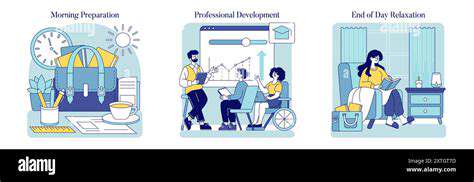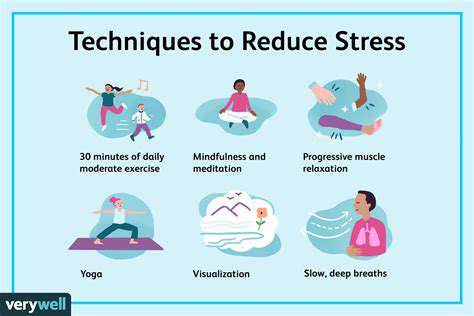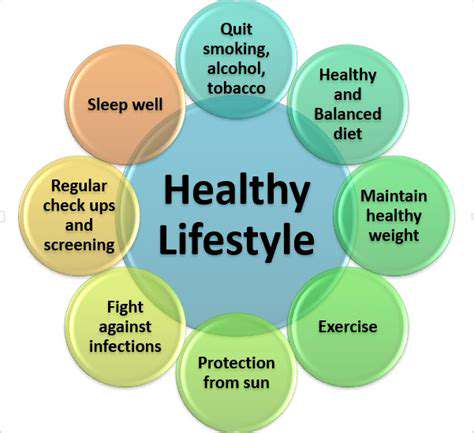Best Ways to Unwind After a Stressful Day

Creating a Consistent Schedule
A relaxing routine isn't about magically appearing calm; it's about establishing a consistent schedule that supports your well-being. This involves planning specific times for activities like exercise, mindfulness, and downtime. Consistency is key to building a routine that becomes ingrained, making it easier to manage stress and improve your overall mood. A consistent schedule helps regulate your body's natural rhythms, promoting better sleep and reducing feelings of overwhelm.
Planning your day in advance can also help reduce stress and anxiety. Knowing what to expect can help you feel more in control and less reactive to unexpected events. By incorporating a consistent schedule into your daily life, you are actively taking steps to cultivate a more peaceful and productive existence.
Incorporating Mindfulness Practices
Mindfulness practices, such as meditation or deep breathing exercises, can significantly enhance relaxation. These practices help you focus on the present moment without judgment, allowing you to detach from anxious thoughts and worries. Mindfulness helps reduce stress hormones and promote a sense of calm. Taking just a few minutes each day to practice mindfulness can have a profound impact on your overall well-being.
Regular mindfulness practice can help you develop greater self-awareness, allowing you to identify and address stress triggers more effectively. By cultivating a present-moment awareness, you can navigate daily challenges with greater ease and acceptance. This can lead to a more peaceful and fulfilling life.
Prioritizing Self-Care Activities
Self-care isn't about indulgence; it's about actively nurturing your physical, mental, and emotional well-being. Incorporating activities like taking a warm bath, reading a book, or engaging in hobbies can significantly contribute to relaxation. These activities allow you to disconnect from demanding tasks and focus on your own needs.
Prioritizing activities that bring you joy and relaxation is essential for maintaining a healthy lifestyle. These activities provide a sense of rejuvenation and help you recharge after a busy day. It's important to identify activities that specifically bring you comfort and engage you in a positive manner.
Establishing a Relaxing Evening Routine
A relaxing evening routine sets the stage for a restful night's sleep. Activities like taking a warm bath, listening to calming music, or reading a book can help unwind and prepare your body for sleep. Creating a consistent bedtime routine signals to your body that it's time to wind down, promoting better sleep quality.
By creating a quiet and peaceful atmosphere before bed, you can minimize distractions and promote better sleep. This will lead to increased energy levels and a more positive outlook throughout the day.
Physical Activity for Stress Relief: Moving Your Body
Incorporating Movement into Your Routine
Finding time for physical activity, even in small doses, can significantly impact stress levels. Regular exercise, whether it's a brisk walk, a yoga session, or a dance party in your living room, releases endorphins, natural mood boosters that can combat feelings of anxiety and tension. These endorphins not only elevate your mood but can also provide a much-needed distraction from the stressors of daily life, offering a healthy escape and a chance to clear your head.
Starting with small, manageable steps is key. If you're currently sedentary, aim for 10-15 minutes of activity most days of the week. Gradually increase the duration and intensity as your fitness improves. Finding an activity you genuinely enjoy is crucial for long-term adherence. Whether it's swimming, hiking, playing a sport, or simply stretching, the key is to make it a regular part of your self-care routine.
The Physiological Benefits of Physical Activity
Engaging in physical activity isn't just about feeling better; it's about actively improving your physical and mental well-being. Exercise helps regulate the body's stress response by lowering cortisol levels, the hormone associated with stress. This reduction in cortisol can lead to a calmer mind and a more relaxed body, making it easier to unwind and de-stress after a demanding day. Moreover, the physical exertion promotes better sleep, another crucial element in managing stress effectively.
Physical activity also boosts the production of neurotransmitters like serotonin and dopamine, which play a vital role in regulating mood. This positive impact on brain chemistry translates to a more positive outlook and a greater ability to cope with stressful situations. In essence, physical activity acts as a powerful tool for mitigating the negative effects of stress on both your mind and body.
Choosing Activities that Suit Your Needs
When it comes to stress relief through physical activity, the perfect activity is one that resonates with you and fits seamlessly into your lifestyle. Consider your preferences and available resources. Do you enjoy the solitude of a morning run? Or perhaps you'd prefer the camaraderie of a team sport? Exploring various options allows you to discover activities that genuinely bring you joy, making the process of unwinding less of a chore and more of a rewarding experience. Don't be afraid to experiment with different forms of exercise to find what truly works for you.
If you have any underlying health conditions, consulting with a healthcare professional before starting a new exercise regimen is essential. They can provide personalized recommendations and ensure that the chosen activity aligns with your specific needs and limitations. This proactive approach safeguards your well-being and ensures that your journey toward stress relief is both effective and safe.
Some people think best out loud in meetings. Others need time to process ideas alone before responding. The secret to great remote communication is honoring these differences. For your quick-thinking team members, keep Slack channels active. For your deep thinkers, use email or shared documents where they can reflect before responding.
Nourishing Your Body and Mind: The Power of Healthy Habits
Prioritizing Sleep for Optimal Well-being
Adequate sleep is foundational to both physical and mental health. When we prioritize sleep, we're not just allowing our bodies to repair and rejuvenate; we're also setting the stage for better cognitive function, emotional regulation, and overall well-being. A consistent sleep schedule, creating a relaxing bedtime routine, and ensuring a dark, quiet, and cool sleep environment are all crucial steps in optimizing sleep quality. This, in turn, allows our bodies and minds to recharge, reducing stress and improving our ability to manage daily tasks and challenges with greater clarity and resilience.
Getting enough sleep isn't just about the quantity; it's also about the quality. Limiting screen time before bed, avoiding large meals close to bedtime, and engaging in calming activities like reading or taking a warm bath can significantly improve the quality of your sleep. By prioritizing sleep, you're not only improving your immediate well-being, but you're also setting yourself up for long-term health and happiness.
Nourishing Your Body with a Balanced Diet
A balanced diet plays a vital role in maintaining both physical and mental health. By incorporating a variety of fruits, vegetables, lean proteins, and whole grains into your daily meals, you're fueling your body with the essential nutrients it needs to function optimally. A diet rich in vitamins, minerals, and antioxidants helps support healthy bodily functions, boosts energy levels, and contributes to a stronger immune system. This, in turn, can positively impact your mood, focus, and overall sense of well-being.
Mindfulness and Stress Management Techniques
In today's fast-paced world, stress is often an unavoidable part of life. However, chronic stress can have significant negative impacts on both physical and mental health. Developing mindfulness practices, such as meditation or deep breathing exercises, can be incredibly helpful in managing stress levels and promoting a sense of calm and well-being. Taking time each day to engage in activities that reduce stress and promote relaxation can significantly improve your overall quality of life.
Engaging in regular physical activity, spending time in nature, or pursuing hobbies you enjoy can also be effective stress-management techniques. By incorporating these practices into your daily routine, you're not only improving your current well-being but also fostering resilience to manage future stressors more effectively.

Read more about Best Ways to Unwind After a Stressful Day
Hot Recommendations
-
*Guide to Managing Gout Through Diet
-
*Best Habits for Financial Well being
-
*How to Build a Routine for Better Mental Health
-
*How to Eat Healthy on a Budget [Tips & Meal Ideas]
-
*Guide to Practicing Self Acceptance
-
*How to Incorporate More Movement Into Your Day
-
*Guide to Managing Chronic Pain Naturally
-
*Guide to Building a Reading Habit for Well being
-
*Top 5 Weight Loss Supplements That Actually Work
-
*Best Exercises for Postpartum Recovery [Beyond Abdominal Work]
![Best Meditation Apps for Beginners [2025 Review]](/static/images/26/2025-05/Top3MeditationAppsforBeginnersin2025.jpg)









![Best Food Sources for Iron [Vegetarian and Non Vegetarian]](/static/images/26/2025-05/BeyondFood3ALifestyleConsiderations.jpg)
